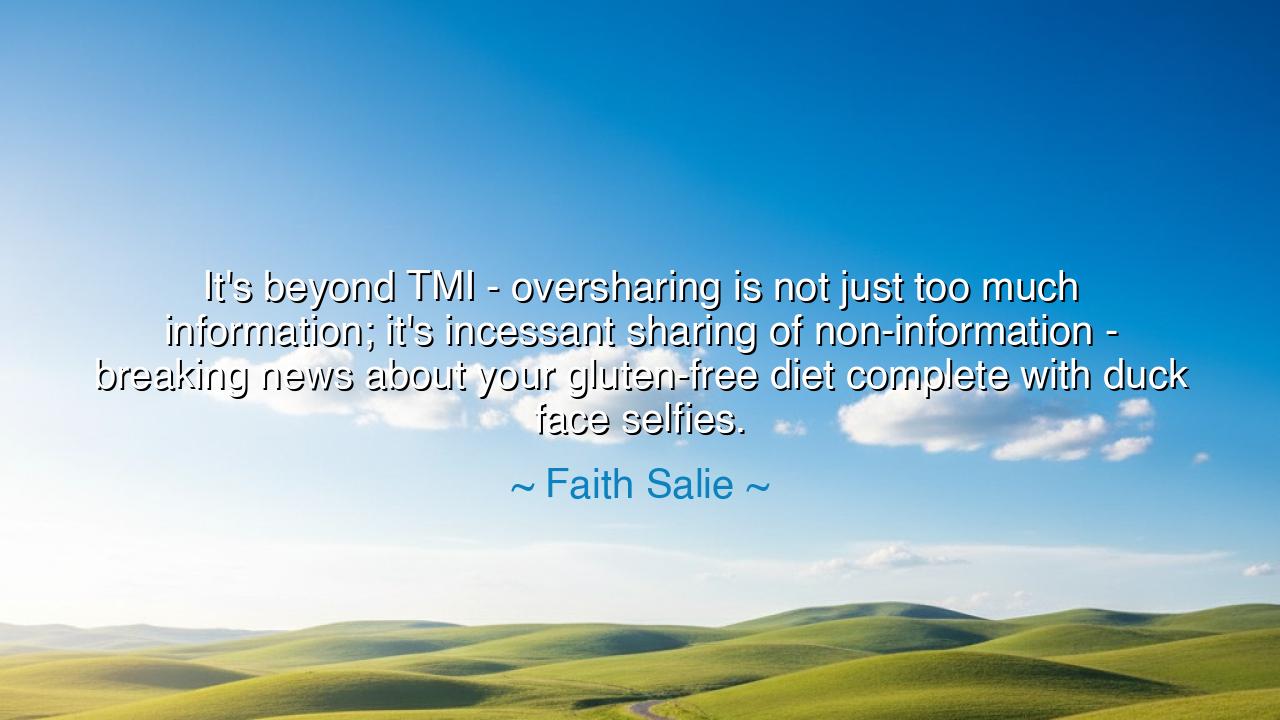
It's beyond TMI - oversharing is not just too much information;
It's beyond TMI - oversharing is not just too much information; it's incessant sharing of non-information - breaking news about your gluten-free diet complete with duck face selfies.






Hear now, O seekers of truth, the words of Faith Salie, a sage who speaks with clarity about the nature of our modern communication: "It's beyond TMI - oversharing is not just too much information; it's incessant sharing of non-information - breaking news about your gluten-free diet complete with duck face selfies." In these words, she uncovers a deep truth about the modern world, where the abundance of information often leads to the loss of its meaning. She warns us about the dangers of oversharing—the act of exposing not just too much, but too much that is insignificant, and how this constant flood of trivialities dulls the mind and clutters the spirit.
The ancients understood that wisdom was not to be found in the quantity of words spoken, but in the quality of the message. Socrates, in his dialogues, often spoke of the dangers of excess, urging his followers to speak only with purpose and clarity. He believed that a wise person should know when to speak and when to remain silent, for words—like all things—carry the weight of their intention. In this, we see the roots of Faith Salie’s warning. Just as the Socratics cautioned against mindless chatter, so too does Salie urge us to resist the temptation to share non-information, the trivial, and the insignificant. What we offer to the world should serve a higher purpose, not merely fill the space with noise.
In the same vein, consider the ancient Romans, whose culture placed great value on the art of oratory. A powerful speech, they believed, could change the course of history. But the great speakers—like Cicero—understood that speech must be measured, carefully crafted to inform, to persuade, or to inspire. To speak without purpose, to flood the world with insignificant details, would have been seen as a waste of one’s voice and a failure of duty. In much the same way, Faith Salie calls upon us to remember that our words—our public voices—should not be squandered on the superficial, but should seek to elevate, to deepen, and to offer meaning to those who hear.
Let us also turn to the wisdom of the Buddha, who taught that true communication comes not from the flood of words, but from the silence between them. The Buddha believed that the true essence of speech is not in its volume, but in its ability to foster peace, understanding, and clarity. When one speaks too much—especially of insignificant things—it becomes difficult to hear the whispers of true wisdom. The Buddha’s silence was not an absence of speech but a form of speaking with deep intention, a reminder that we must not be consumed by the desire to fill every moment with sound. So too does Faith Salie point to the flood of trivialities that drowns the possibility of genuine communication, urging us to be mindful of what we share and why we share it.
Now, consider the ancient Greek notion of the "golden mean", which teaches that moderation is the key to a virtuous life. The philosopher Aristotle proposed that we should not fall into the extremes of excess or deficiency, but seek the balance in all things. It is in this balance that true wisdom resides. To speak only when necessary, and to offer words of substance, is an example of the golden mean. Faith Salie’s critique of oversharing is not merely about the inconvenience of too many posts on a social media feed; it is a call for balance—a reminder that when we share too much, especially of the insignificant, we fail to honor the power of true connection and the dignity of speech itself.
In this modern age, where the flood of information has become a torrent, it is all too easy to get swept away by the current of constant sharing. Yet, in the act of oversharing—whether it be trivial updates about diets, selfies, or fleeting moments—we lose the ability to reflect on what truly matters. Just as the ancients advised against speaking hastily or filling the air with idle chatter, so must we learn to discern the difference between what should be shared and what should be kept silent. In doing so, we preserve the sanctity of our words, ensuring that they are offered with intention, with purpose, and with respect.
Let us, then, reflect on Faith Salie’s words and seek to reclaim the art of meaningful communication. Let us resist the temptation to overshare, to fill the void with noise that adds nothing of value to the world. Instead, let us speak when we have something to say, something that has the power to enlighten, to inspire, and to move others toward greater understanding. In this, we will not only honor the ancient wisdom of Socrates, Aristotle, and the Buddha, but we will also contribute to a world where communication is a source of wisdom, not a flood of endless trivia.






AAdministratorAdministrator
Welcome, honored guests. Please leave a comment, we will respond soon